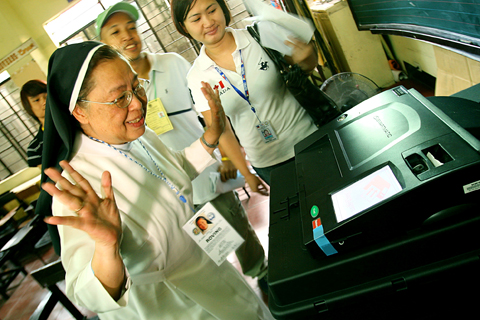Problems with ballot machines yesterday kept some Filipino voters waiting for hours, including the presidential frontrunner, and may have lowered turnout, but there was no sign of widespread failure that would derail the elections.
Officials had expected turnout as high as 85 percent, but analysts and election monitors said the actual figure could be much lower as many had given up and gone home without voting.
With widespread technical failure and serious violence not materializing, the main risks now would be a very low turnout figure, or problems with the transmission and collation of results, expected to start yesterday evening.

PHOTO: EPA
“Many of the problems experienced thus far were expected, but major voter frustration and disenfranchisement could result in lower than expected turnout, and compromise election results,” consultancy Pacific Strategies & Assessments said.
Challenges and unrest are also a risk if the clear frontrunner in opinion polls, Senator Benigno “Noynoy” Aquino, does not win the race to succeed Philippine President Gloria Macapagal Arroyo.
Opinion polls suggest Aquino will be the next president. He had a 20-point lead over former president Joseph Estrada and Senator Manny Villar, with Gilberto Teodoro, candidate of the outgoing administration, a distant fourth.
In a country where some degree of violence and chaos is regarded as normal during elections, most voters took technical hitches in their stride and waited patiently for their turn.
“I prayed for a peaceful election, so our country can move forward. People are sick and tired of the cheating and fraud in the past elections,” 57-year-old voter Danilo Arriola said.
The use of a new and untested automated voting system posed a major risk for the election and concerns rose following the recall of more than 76,000 memory chips after a fault was found.
While the glitches caused the election commission to extend voting by an hour to 7pm, they did not appear widespread or serious enough to fatally undermine the polls. Even after 7pm, voters who had been within 30m of a polling station were allowed to vote.
The military reported 37 incidents of election day violence, with at least nine dead and 12 wounded, including a gunfight in Maguindanao, where 57 people died in an election-related massacre in November last year.

MORE VISITORS: The Tourism Administration said that it is seeing positive prospects in its efforts to expand the tourism market in North America and Europe Taiwan has been ranked as the cheapest place in the world to travel to this year, based on a list recommended by NerdWallet. The San Francisco-based personal finance company said that Taiwan topped the list of 16 nations it chose for budget travelers because US tourists do not need visas and travelers can easily have a good meal for less than US$10. A bus ride in Taipei costs just under US$0.50, while subway rides start at US$0.60, the firm said, adding that public transportation in Taiwan is easy to navigate. The firm also called Taiwan a “food lover’s paradise,” citing inexpensive breakfast stalls

TRADE: A mandatory declaration of origin for manufactured goods bound for the US is to take effect on May 7 to block China from exploiting Taiwan’s trade channels All products manufactured in Taiwan and exported to the US must include a signed declaration of origin starting on May 7, the Bureau of Foreign Trade announced yesterday. US President Donald Trump on April 2 imposed a 32 percent tariff on imports from Taiwan, but one week later announced a 90-day pause on its implementation. However, a universal 10 percent tariff was immediately applied to most imports from around the world. On April 12, the Trump administration further exempted computers, smartphones and semiconductors from the new tariffs. In response, President William Lai’s (賴清德) administration has introduced a series of countermeasures to support affected

CROSS-STRAIT: The vast majority of Taiwanese support maintaining the ‘status quo,’ while concern is rising about Beijing’s influence operations More than eight out of 10 Taiwanese reject Beijing’s “one country, two systems” framework for cross-strait relations, according to a survey released by the Mainland Affairs Council (MAC) on Thursday. The MAC’s latest quarterly survey found that 84.4 percent of respondents opposed Beijing’s “one country, two systems” formula for handling cross-strait relations — a figure consistent with past polling. Over the past three years, opposition to the framework has remained high, ranging from a low of 83.6 percent in April 2023 to a peak of 89.6 percent in April last year. In the most recent poll, 82.5 percent also rejected China’s

PLUGGING HOLES: The amendments would bring the legislation in line with systems found in other countries such as Japan and the US, Legislator Chen Kuan-ting said Democratic Progressive Party (DPP) Legislator Chen Kuan-ting (陳冠廷) has proposed amending national security legislation amid a spate of espionage cases. Potential gaps in security vetting procedures for personnel with access to sensitive information prompted him to propose the amendments, which would introduce changes to Article 14 of the Classified National Security Information Protection Act (國家機密保護法), Chen said yesterday. The proposal, which aims to enhance interagency vetting procedures and reduce the risk of classified information leaks, would establish a comprehensive security clearance system in Taiwan, he said. The amendment would require character and loyalty checks for civil servants and intelligence personnel prior to